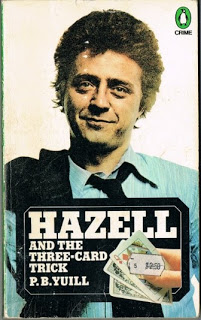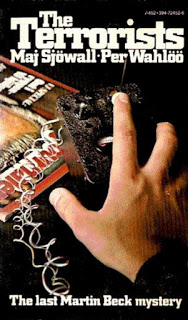Tuesday, September 25, 2012
The Terrorists by Maj Sjöwall and Per Wahlöö (Harper Perennial 1975)
Thursday, May 12, 2011
Hazell and the Three-Card Trick by P.B Yuill (Penguin Books 1975)

The pub Minty chose was rough even by Hammersmith standards. Of course there's good parts and bad parts of Hammersmith. This pub was as bad as any going.
Minty was already at the slopping bar when I pushed through the dingy saloon door.
It wasn't rough meaning violent - just horrible. The paper was coming off the walls in damp patches and the decor was like an old railway waiting-room with one difference. The lighting. I've never been in such a brightly-lit boozer. It was glaring.
The staff was an Irish bloke about twenty-five. He had the beer gut of a much older man. It was straining against a grey vest that in its turn was trying to pop out where his shirt buttons were missing.
From his pained movements and sharp sighs and groans it was possible he was suffering the worst hangover since Pisa. He hadn't shaved that day, although that was hardly likely to upset the clientele.,/p>
Actually I feel sorry for the Irish who come over here to wear big letters on their backs. They generally leave the wife at home on holy soil and only see her at Xmas to father next year's crop. In between Xmases they doss down in cheap rooms and send the wife's money home by postal order and drink themselves silly to fill up the void.
Thumping each other and kicking Chinese waiters is about the height of their swinging lives. They don't seem to have much interest in the local women and they tend to stick to their own pubs. 'It's gone Irish,' you'll hear people say about a rub-a-dub that's been taken over by the big men with the pixie ears. It's not meant as a recommendation.
I say sorry but not enough to want ten of them home for a cooked meal.
Tuesday, May 04, 2010
Ragtime by E L Doctorow (Picador 1975)
In New York City the papers were full of the shooting of the famous architect Stanford White by Harry K. Thaw, eccentric scion of a coke and railroad fortune. Harry K. Thaw was the husband of Evelyn Nesbit, the celebrated beauty who had once been Stanford White's mistress. The shooting took place in the roof garden of the Madison Square Garden on 26th Street, a spectacular block-long building of yellow brick and terra cotta that White himself had designed in the Sevillian style. It was the opening night of a revue entitled Mamzelle Champagne, and as the chorus sang and danced the eccentric scion wearing on this summer night a straw boater and heavy black coat pulled out a pistol and shot the famous architect three times in the head. On the roof. There were screams. Evelyn fainted. She had been a well-known artist's model at the age of fifyeen. Her underclothes were white. Her husband habitually whipped her. She happened once to meet Emma Goldman, the revolutionary. Goldman lashed her with her tongue. Apparently there were Negroes. There were immigrants. And though the newspapers called the shooting the Crime of the Century, Goldman knew it was only 1906 and there were ninety-four years to go.


